Christianity, Gore, and Death
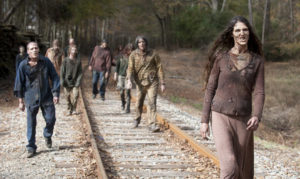 The Christian Examiner ran an article recently on the gore of the AMC TV show, The Walking Dead, and how its fascination with death and the gore associated with it depicted in the show runs counter to a Christian viewpoint. Franklin Graham is quoted from January’s edition of Decision magazine:
The Christian Examiner ran an article recently on the gore of the AMC TV show, The Walking Dead, and how its fascination with death and the gore associated with it depicted in the show runs counter to a Christian viewpoint. Franklin Graham is quoted from January’s edition of Decision magazine:
That program is just one of numerous televisions programs that have garnered tremendous followings by fixating on gore and death. . . . At least half a dozen prime time shows are strangely enamored and captivated by it. . . . These shows, when combined with hugely popular video games like Mortal Kombat, demonstrate how obsessed with death our culture has become.
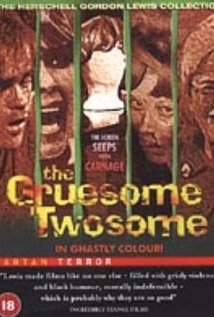
“Think you’ve seen blood and gore? Think you’ve seen wild, way-out humor?
You ain’t seen nothing yet!”
There is no question The Walking Dead is a gore-fest. Rolling Stones columnist Rob Sheffield, in November 2012, called it “the grossest show in TV history.” A quick search on YouTube offers up gruesome death scenes that remind me of the film I saw when I was 5 or 6, The Gruesome Twosome, that gave me a lifelong aversion to that sub-genre. I only watched about a minute of a ten minute depiction of death scenes in the TV series before bowing out. I got the picture.
While I sympathize with Mr. Graham’s concerns about our society’s fascination with gore and death, I respectfully submit that his reaction, like many Christians on this subject, is equally in error. It is not enough to condemn it, wash our hands of it, and move on.
I don’t think it is an obsession with death that is the problem, but an over-focus on death for entertainment as opposed to strengthening spiritual character.
The Bible doesn’t shy away from death. It even depicts a few gruesome deaths. It states we will all die. Jesus also talks about His own death extensively with His disciples. One of the central events depicted in the New Testament is the death of Jesus on the cross, by which He defeats death through death. Paul depicts baptism as a form of death and resurrection; the dying of the Old Man and the renewing of him by the Giver of Life, Jesus Christ. Death and life are central themes to the Gospel.
Jesus warns, “And fear not them which kill the body, but are not able to kill the soul: but rather fear him which is able to destroy both soul and body in hell.” (Mat 10:28 ASV)
But what do we tend to do? We view death as gruesome and gory, and do our best to hide it out of sight. We avoid the reality in favor of keeping it a fantasy trope. Like the Roman citizen’s enjoying an evening out at the Colosseum to watch lions devour a victim, who is deemed to have deserved it, we’d rather face the gore of death on the screen and treat it as mere entertainment.
When I lived in Bethany, Oklahoma in the 80s, people began to complain about the dead-cat truck. The city regularly had an employee collecting dead cats and piling them into the open bed of a truck to haul off and dispose. That meant people who pulled up behind this truck at stop lights had a front row seat to piles of dead cats. The city eventually had to cover the truck bed to halt the complaints.
Yet, many of those same people probably went home that evening and watched a violent TV show where people died. We hide from the reality by experiencing it as entertainment. Fr. Stephen Freeman drives home this point:
I have often asked the question, “How many of you have seen a baby be born?” and “How many of you have actually witnessed a person’s death?” I am still surprised when the answer comes out to be but a small minority. There are two things people have to do: be born and die. However, it appears that a majority of modern populations have seen neither (women obviously have an advantage over men in witnessing the birth of a child).
I bet if he had then asked how many had viewed someone dying in a movie or TV show, a majority of the hands would have shot up.
A key characteristic of Christian fiction is how it handles death.
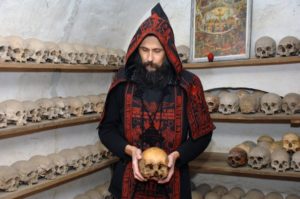
Monks surround themselves with reminders of death. Not out of morbidity, but to stay focused on what matters.
Does the story hide from the reality of death? Is death mere entertainment? Are the “bad guys” consistently ending up dead while the “good guys” always avoiding it? Is death seen mainly as a punishment or defeat?
Or is death, in all its reality, faced head on? Is death infused with meaning rather than something to avoid? Is physical death not depicted as the end and ultimate evil, but rather the second death at the Great Judgment? Is there victory in death? Has death lost its sting?
While I understand the marketing concerns to a CBA audience, the reality is the absence of sex, gore, cussing, and violence doesn’t make a book Christian-compatible. How it handles death, however, determines how in sync with the Gospel a book is.
Do Christians need to focus on the reality of death more completely? How can Christian fiction aid that instead of being a diversion from it?


































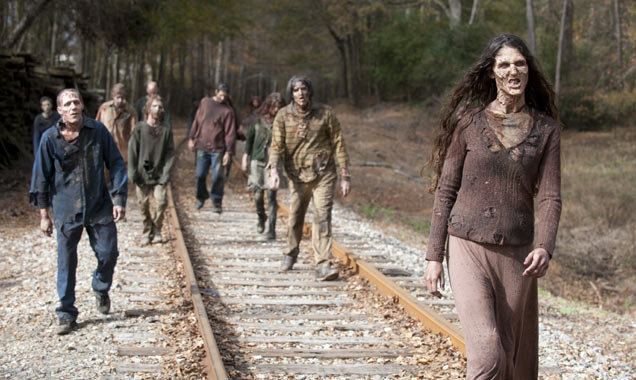


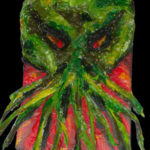
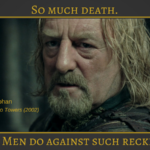




Rick, my current work in progress includes combat and shows death in a way the CBA probably would not approve of. For me, death is one of those subjects that a writer must deal with and at times it is appropriate to show death can be horrific.
I’m a fan of The Walking Dead but I will be the first to tell you that its view of death is clearly not Christian. The bad part isn’t that death or gore happens, but that it shows meaningless, purposeless death over and over. Whereas many people dealing with real situations where many people die (such as combat) walk away from the experience with a heightened sense of God and His mysterious control over every aspect of both life and death, The Walking Dead takes a much more evolutionary approach–the strong survive and if the weak are allowed to live, it is because of some inherent goodness in humanity that death can’t wash away (or more cynically, because of a survival instinct that prizes not just the individual, but the group). The interplay between good and evil is part of what fascinates me about the show–but a truly Christian take on the same story situation would be fundamentally different.
This has always been the strange contradiction in the media world – you can show violent death, only if it’s scripted. If it’s a real body in that body bag, you’d better not run that picture.
(See this article about a recent example)
It’s something that’s talked about and argued about in newsrooms and journalism classrooms all across the country.
It’s almost as if Americans are trying to relegate death and gore and dying into the purely fictional world. It’s not that we have a love affair with death. We have a love affair with fictionalizing death. It’s like we think that the more gore we can pack into the fiction world, the less of it there will be in the real world.
America will watch and love “The Walking Dead,” then tune into the news, and then switch it right off the moment they start talking about Nigeria or IS, because “it all just makes them depressed” and they ask “why can’t they talk about something positive in the world for once.”
The faith built on the physical wounds of the Godman, fearing death and gore? Honestly if that’s not ironic only god knows what is
Lyrewulf…
It’s not a matter of fearing death and gore, but celebrating it. The gratuitous, and often times meaningless display of violent death certainly is an evil.
Or are you saying that since Christ suffered a torturous, violent, bloody death that I should somehow have no problem with and/or approve of zombie films? Or enjoy looking at photos of fatalities in auto accidents?
I’m a fan of The Walking Dead myself, but I’d hold off condemning it. The Dead is a metaphor for the fear of societal collapse that pervades our nation today. The government failed to contain it — their efforts made it worse — and every attempt to form another government (i.e. the Governor or Terminus) turns out badly. I think that’s where Z-Nation is headed too. How do we handle life when there’s no authorities in charge, no electricity, no safety and even our fellow living people treat us in truly horrible ways?
If I were writing a Christian zombie novel, the zombie virus would be a metaphor for sin. We all have it in us and if we die without God, we become zombies. I can see some definite possible story lines if a Christian writer wanted to tackle the subject. Ted Dekker or Frank Peretti have probably already considered them.
Check out a book by Matt Mikalatos called
“Night of the Living Dead Christian.”
It’s a comedy about life as a Christian… and a werewolf. And there are zombies. And a vampire. …. And it packs a surprising punch at the end. I highly recommend it.
(http://www.amazon.com/gp/aw/d/1414338805/ref=redir_mdp_mobile/181-1321972-4846265)
For it to be a metaphor for sin, there would be have to be some way to bring zombies back from being zombies, back to being human again–though it might even be better for them to come back as something not quite human, something better…
I’ve considered writing such a tale. 🙂
I’ve written something like that, for an old nanowrimo project. I should edit it and self-pub, but it’s particularly gruesome. I think I’ve watched far too much horror to make a “cozy” kind of Christian horror like Peretti or Dekker.
Death and gore are not necessarily the same. You have shows like Call the Midwife, where there might be an episode focusing on hospice care, but very little gore related to the death, or you can have Walking Dead, with death and gore, but the in-show perspective is very different.
Correct, Julie. I don’t think I was implying they were the same. The gore and death in “The Walking Dead” was merely a launching point to discuss how we avoid looking at death in real life while heartily embracing it in our entertainment. The gore is not a necessary component of it, but seems to have a substantial following of people who enjoy it.
My main point being a story, whether movie, TV show, or book, can best be evaluated for its “Christianness” by how it treats and deals with death, whether or not gore is involved.